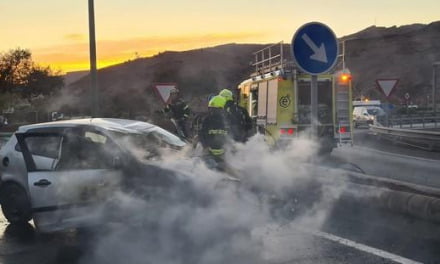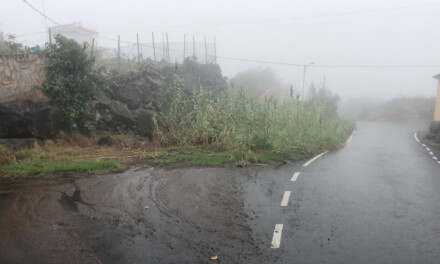[fb_plugin like][fb_plugin save]
In a statement released today, the Deputado del Comun, Rafael Yanes, the Canary Islands Parliament’s High Commissioner for the defence of citizen’s basic social rights here on the islands, has reported having met with the representatives of ACES, Orlando Viera and Alberto Pérez, who communicated the urgent needs of the more than 200 patients, currently with HIV, who reside in the municipality of San Bartolomé de Tirajana, on the south of Gran Canaria, who are forced to undertake an arduous regular journey to collect prescribed medications which, in the opinion of the not-for-profit who have been operating on the island since 1996, should be made available closer to where they live.
The not-for-profit group, who have been instrumental in highlighting the plight of HIV sufferers, affirmed that patients living with this disease, and with other associated pathologies, consistently present physical problems or lack of means in being able to travel long distances.
“The neighbourhood of El Calero, which is where they must pick up their medication, does not have the best signage or access. There are many patients who do not have money for the bus, or enough energy to get around, due to pathologies associated with the disease”, the ACES spokespersons pointed out.
The goal is for these patients to be able to pick up their antiretroviral medication at the Maspalomas health centre, where they are registered, and where they reside legally.
“The Management of the Maspalomas Health Centre has shown total agreement with this problem, but it must be the Insular Hospital that gives the go-ahead for this medication to be delivered to the Centre” they add.
Yanes has promised to transfer the request to the Canary Islands’ Minister of Health, Blas Trujillo. “What this Association is asking for seems very reasonable to us. They are satisfied with the care and professionalism of the health workers, but they request they bring medical care closer to people, something that I know is in line with the intentions of the Health Minister himself” he concluded.
 GLAY President, André van Wanrooj, responsible for the Gays and Lesbians Associates of Yumbo, in Playa del Inglés, who founded Maspalomas PRIDE Gran Canaria 20 years ago this year, has said unequivocally “This deserves our support. Cancer patients are able to get most of their medication at the regular pharmacy. Only chemotherapy, and a few very specific medications (in relation to radiation therapy) are available only in the hospital (Insular and/or Negrin). Chemo-pumps can be replaced at the Centro Salud Maspalomas but HIV sufferers and cardio patients have to get their meds at El Calero in Telde. It is a very long way to travel, particularly for anyone who is battling a life threatening illness.”
GLAY President, André van Wanrooj, responsible for the Gays and Lesbians Associates of Yumbo, in Playa del Inglés, who founded Maspalomas PRIDE Gran Canaria 20 years ago this year, has said unequivocally “This deserves our support. Cancer patients are able to get most of their medication at the regular pharmacy. Only chemotherapy, and a few very specific medications (in relation to radiation therapy) are available only in the hospital (Insular and/or Negrin). Chemo-pumps can be replaced at the Centro Salud Maspalomas but HIV sufferers and cardio patients have to get their meds at El Calero in Telde. It is a very long way to travel, particularly for anyone who is battling a life threatening illness.” “GLAY,” he added “and the wider Maspalomas community, whole-heartedly support ACES in their demands to help all fighters and survivors, who depend on such medications, to be able to access their prescriptions on the south of the island, rather than having to travel often unmanageable distances, which then requires the assistance of already over-stretched volunteer groups like ACES and GLAY. We have faith that this issue can be resolved as a matter of great urgency.”
Orlando Viera Morales tells TheCanaryNews.com that since November 2021, he has been trying to get the Centro de Salud Maspalomas, health centre, to provide a place to pick up Antiretroviral Medication, for all Residents in San Bartolomé de Tirajana, suffering with HIV/AIDS. In his outreach program, in which he has been a lead volunteer for nearly 3 decades, he has regular contact with around 100 patients living in the area, and many more who visit him with less regularity for help and advice.
He has personally delivered letters and requests to the Insular Hospital, to the Servicio Canario de Salud, the Gerencia de Atención Primaria de Gran Canaria (Gran Canaria Primary Care Management) and to the Ayuntamiento de San Bartolomé de Tirajana town hall, who administrate the Maspalomas and Playa del Inglés areas.
He says that though they have received the verbal support of the southern Town Council, they have not, to date, received a response from Servicio Canario de Salud, Canarian Health Service, who are the ones who can authorise a Pharmacy Service such as this in Centro de Salud de Maspalomas.
“At the moment everyone must go to El Calero Hospital in Telde, with bad consequences for the patients” says Orlando Viera Morales “It is too far from San Bartolomé de Tirajana, and direct transport does not exist, the patients must go via a bus that stops in Melenara, then take a taxi to the hospital in El Calero, and then to do the same trip in reverse. Many of them do not have the resources, or they feel too sick to travel by bus and walk all the way to the hospital.”













